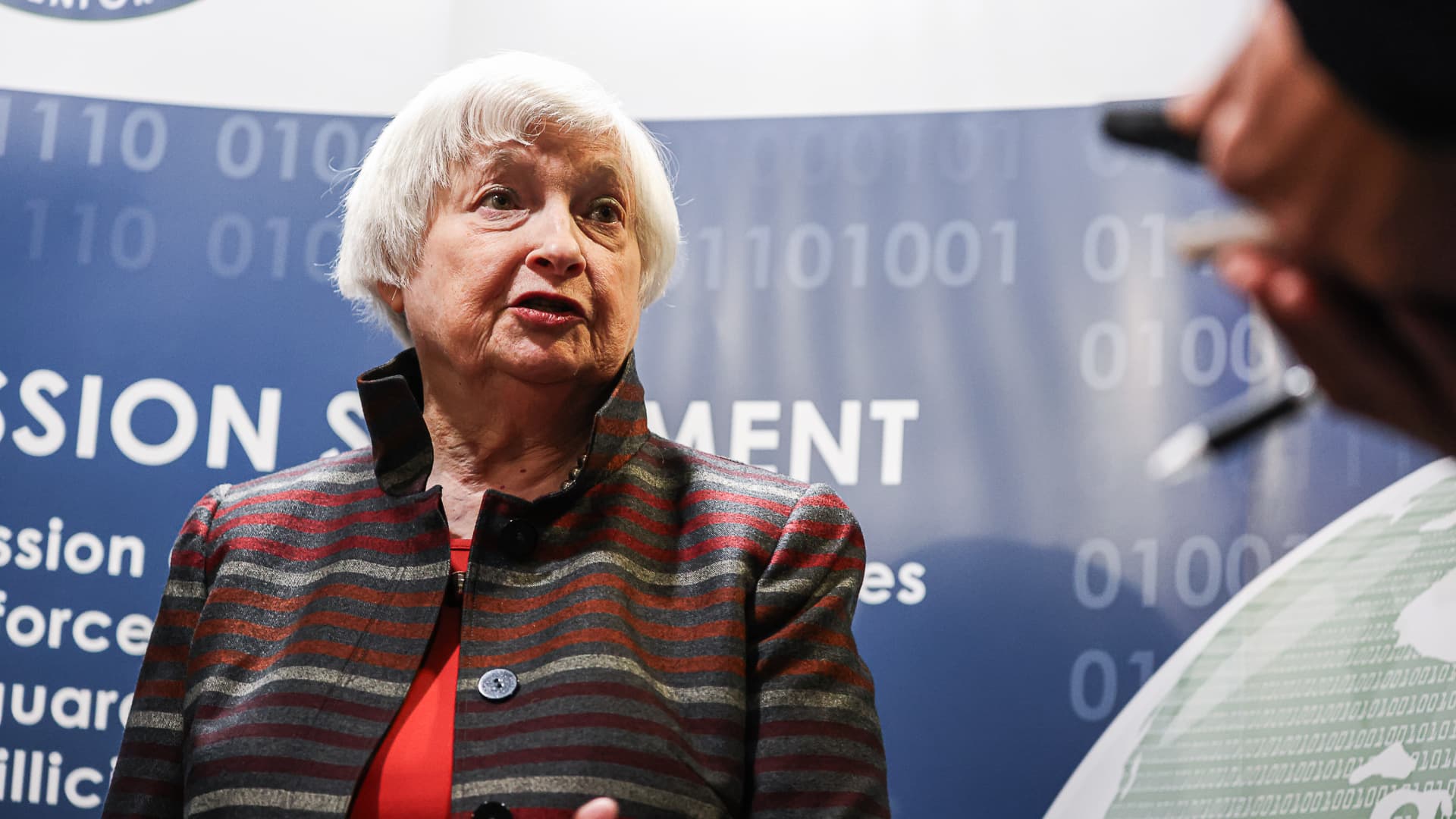Janet Yellen, U.S. Treasury secretary, on a tour of the Financial Crimes Enforcement Network (FinCEN) in Vienna, Virginia, on Jan. 8, 2024.
Valerie Plesch/Bloomberg via Getty Images
The U.S. Treasury Department has delayed the deadline for millions of small businesses to Jan. 13, 2025, to file a new form, known as a Beneficial Ownership Information report.
The Treasury had initially required many businesses to file the report to the agency’s Financial Crimes Enforcement Network, known as FinCEN, by Jan. 1. Noncompliance carries potential fines that could exceed $10,000.
This delay comes as a result of legal challenges to the new reporting requirement under the Corporate Transparency Act.
The rule applies to about 32.6 million businesses, including certain corporations, limited liability companies and others, according to federal estimates.
Businesses and owners that didn’t comply would potentially face civil penalties of up to $591 a day, adjusted for inflation, according to FinCEN. They could also face up to $10,000 in criminal fines and up to two years in prison.
However, many small businesses are exempt. For example, those with over $5 million in gross sales and more than 20 full-time employees may not need to file a report.
Why Treasury delayed the BOI reporting requirement
The Treasury delayed the compliance deadline following a recent court ruling.
A federal court in Texas on Dec. 3 had issued a nationwide preliminary injunction that temporarily blocked FinCEN from enforcing the rule. However, the 5th U.S. Circuit Court of Appeals reversed that injunction on Monday.
“Because the Department of the Treasury recognizes that reporting companies may need additional time to comply given the period when the preliminary injunction had been in effect, we have extended the reporting deadline,” according to the FinCEN website.
FinCEN didn’t return a request from CNBC for comment about the number of businesses that have filed a BOI report to date.
Some data, however, suggests few have done so.
The federal government had received about 9.5 million filings as of Dec. 1, according to statistics that FinCEN provided to the office of Rep. French Hill, R-Ark. That figure is about 30% of the estimated total.
Hill has called for the repeal of the Corporate Transparency Act, passed in 2021, which created the BOI requirement. Hill’s office provided the data to CNBC.
More from Personal Finance:
‘Returnuary’ — the year’s busiest return season is about to start
Why the ‘great resignation’ became the ‘great stay’
What tariffs mean for car prices
“Most non-exempt reporting companies have not filed their initial reports, presumably because they are unaware of the requirement,” Daniel Stipano, a partner at law firm Davis Polk & Wardwell, wrote in an e-mail.
There’s a potential silver lining for businesses: It’s “unlikely” FinCEN would impose financial penalties “except in cases of bad faith or intentional violations,” Stipano said.
“In its public statements, FinCEN has made clear that its primary goal at this point is to educate the public about the requirement, as opposed to taking enforcement actions against noncompliant companies,” he said.
Certain businesses are exempt from BOI filing
The BOI filing isn’t an annual requirement. Businesses only need to resubmit the form to update or correct information.
Many exempt businesses — such as large companies, banks, credit unions, tax-exempt entities and public utilities — already furnish similar data.
Businesses have different compliance deadlines depending on when they were formed.
For example, those created or registered before 2024 have until Jan. 13, 2025, to file their initial BOI reports, according to FinCEN. Those that do so on or after Jan. 1, 2025, have 30 days to file a report.
There will likely be additional court rulings that could impact reporting, Stipano said.
For one, litigation is ongoing in the 5th Circuit, which hasn’t formally ruled on the constitutionality of the Corporate Transparency Act.
“Judicial actions challenging the law have been brought in multiple jurisdictions, and these actions may eventually reach the Supreme Court,” he wrote. “As of now, it is unclear whether the incoming Trump administration will continue to support the Government’s position in these cases.”

 Blog Post7 days ago
Blog Post7 days ago
 Economics1 week ago
Economics1 week ago
 Finance1 week ago
Finance1 week ago
 Economics1 week ago
Economics1 week ago
 Economics1 week ago
Economics1 week ago
 Personal Finance1 week ago
Personal Finance1 week ago
 Economics1 week ago
Economics1 week ago
 Accounting1 week ago
Accounting1 week ago










